Who Should Investigate DPWH? The People’s Slate vs. the Blue Ribbon Farce
This blog looks at the call to investigate DPWH ghost projects through an independent committee, the people’s nominees, and why real rules and courage matter.


The DPWH ghost project scandal is not just another corruption story. Billions are gone, projects that never existed were funded, and yet we’re expected to trust the same old process of investigation. I’ve watched enough Blue Ribbon hearings to know how this usually ends—lots of soundbites, lots of grandstanding, then nothing. Mauuwi lang ito sa wala.
That’s why I support calls for an independent investigating committee. A body that isn’t weighed down by politics, one that people can actually trust.
I had my own choices in mind for who should lead such a committee. But instead of keeping them to myself, I wanted to know what Morning Coffee Thoughts followers thought. So I made a post asking: who should lead an independent probe into the DPWH ghost projects?
Most people took the question seriously. Names poured in, reasons were explained, and what I thought would be a simple thread turned into a crash course in public vetting. Of course, there was one person who accused me of posting for algorithm engagement. I blocked him. I don’t have time to argue with people like that, and besides, he was wrong. The purpose was clear from the start: to write this blog.
What I found in the comments wasn’t noise. It was standards. Integrity, independence, transparency. And for once, the comment section felt like a town hall.
Why Am I Wary About Third-Party Investigating Committees
Because I haven’t forgotten.
I’ve watched too many “independent” bodies rise with promise, then fold from politics or legal tricks. They gave us headlines and reports, not justice.
In 2010, the Philippine Truth Commission was created to probe Gloria Arroyo’s scandals. Headed by former Chief Justice Hilario Davide Jr., it lasted four months and eight days. On December 7, 2010, the Supreme Court struck it down for singling out one administration, and explicitly said the flaw could have been easily fixed by including other administrations, but Aquino chose to let it die instead of pursuing real accountability (Lawphil; Inquirer Opinion). It was disbanded before doing any substantial investigation, beyond accepting complaints (GMA News).
Go back to 2006. Under heavy international pressure, Malacañang formed the Melo Commission as 749 killings of journalists and activists piled up. Hopes were high. The final report in February 2007 came out biased and incomplete, with families refusing to cooperate and the Palace itself admitting the tilt toward the military. No prosecutions followed, and the killings went on (GMA News; PhilStar; UN HRC).
The PCGG’s Behest Loans Committee was set up on October 8, 1992. For decades it filed cases that courts tossed for weak pleadings and missing elements. The TSMCI case took seven years, then got dismissed for failure to prove bad faith. Hundreds of cases, almost no convictions. In 2017, even Senator Chiz Escudero said to abolish it (Lawphil; Senate PR).
The Commission on Human Rights hurts to mention. Born with the 1987 Constitution, clipped on December 2, 1991 in Carino v. CHR. The Court said it had no judicial or quasi-judicial powers. So the CHR could investigate and recommend, but not prosecute or enforce. It has pushed charter bills for years, still pushing in 2025, and it’s still called a toothless tiger (Lawphil; CHR 2025).
In 2011, DOJ–COMELEC launched a joint probe on the 2004 and 2007 election mess. The rules weren’t properly published, so they were ineffective. Jurisdiction questions dragged it down, politics did the rest. Arroyo was arrested, then walked on technicalities. No systemic reforms followed (SC eLibrary).
Inside DPWH, the cycle repeats. Every secretary forms an “anti-corruption task force,” produces a report, then the next one kills it. The latest was disbanded on September 2, 2025 by Secretary Vince Dizon. Investigating themselves, protecting themselves (Philippine News; YouTube/ANC).
And Congress. The endless Blue Ribbon and House “fact-finding” shows. Fertilizer scam, NBN-ZTE, flood control. Plenty of speeches, cameras, and careful lines to shield friends. Recommendations with no teeth, subpoenas ignored. The current flood control probe is already being called moro-moro (Senate fact-finding scope; Inquirer Opinion).
The pattern is clear: no prosecutorial powers, no real subpoena bite, thin budgets, narrow mandates, and politics baked into the design.
That’s why I’m wary. Independence on paper isn’t independence in the real world. History taught me that.
My Own Committee Picks
The more I read, the clearer it became: people weren’t just throwing names around. They were naming those who had earned their respect.
The one name that kept coming back, again and again, was Heidi Mendoza. For me, she was already the obvious choice to lead. Clean record, fearless with audits, and the kind of courage that doesn’t bend. I smiled when I saw one follower put it simply: “Cielo Magno and Heidi Mendoza are credible to be part of the independent committee. So with Kim Henares.” Exactly. Mendoza is the anchor, the one who sets the tone.
Beside her, I knew I wanted Cielo Magno and Kim Henares. Magno, because she walked away from power when it clashed with her principles. Henares, because she’s the one you call when you need to follow the paper trail. She’s also being floated as a candidate for Ombudsman — and honestly, that’s where I’d love to see her most, if she gets the chance. Between a seat in this committee and the Ombudsman’s chair, the latter would give her more power to go after corruption. But for now, I want her here.
On the law enforcement side, the debate was sharper. Some pushed for Magalong, but the red flags were impossible to ignore. Phillip Yotoko nailed it in one reply: “Dun pa lang sa interview niya that he never regrets supporting Digong nung time niya, red flag na kaagad sa akin yon.” And Zenaida Macaranas reminded us of that hearing where he went against De Lima. Independence and baggage don’t mix. That’s why I leaned toward Gen. Nicolas Torre III instead. As AR Fisheries said: “Magalong has already dipped his feet in politics while Torre is still contemplating retirement…” Torre isn’t perfect, but he hasn’t been fully swallowed by politics yet. That counts for something.
Then there’s the technical side. Babes Singson came up more than once, and for good reason. As Cing Legara put it: “ExSec Babes Singson will be most fitting, he already knows the processes inside DPWH.” In a scandal built on ghost projects, you need someone who understands how the books can be cooked and how the projects can be faked.
But it can’t just be insiders. Airelav Naive was right to insist: “There should be no incumbent politician… But there should be a reputable engineer in the team.” Add a civil society voice, add a professional engineer, and you get a committee that doesn’t just look independent on paper, but feels independent to the people.
And then there are the names of Justice Antonio Carpio and Justice Conchita Carpio Morales. Several followers suggested them, and I understand why. They carry unmatched credibility, independence, and a lifetime of service. In truth, no one doubts that if either of them led this probe, the public would trust the process. But I’ll admit my hesitation. Both of them have already given so much to the Philippines. At this point, asking them to sit in yet another grueling fight feels like I’m asking for too much. Maybe it’s time we let them rest, while still holding their example as the standard we measure others by.
Another name that surfaced was Sonny Trillanes. Some may not like his style, but I can’t deny his patriotism and his consistency in standing up to corruption. If he were part of the committee, he would bring the kind of sharp questioning and aggressive pursuit of truth that others might shy away from. I wouldn’t place him at the center, but as one of the members, his presence could be a counterweight to those who might be tempted to play safe.
So that’s my slate. Mendoza at the center, flanked by Magno and Henares, balanced with Torre and Singson, and grounded by civil society and technical expertise. Not saints, not superheroes, but credible enough to start digging.
And if I had my way, I’d widen the circle even more. I’d love to see lawyers like Atty. Dino de Leon and Atty. Barry Gutierrez, thinkers like Ronald Llamas, Richard Heydarian, Chris Tan, and journalists like Christian Esguerra in the mix. They may not have the engineering or auditing background to dissect ghost projects line by line, but they bring perspective. The ability to zoom in and zoom out. To frame corruption not just as a budget anomaly, but as a governance failure that bleeds into the lives of ordinary people.
I know them for their honesty, their integrity, and their pro-good governance stance. That’s just me, of course. But sometimes, it takes voices like theirs to remind us why accountability matters in the first place.
Beyond the Brew: The Rules Matter
Even with the best people on board, a committee can still collapse if the rules are weak. That’s what history has shown us, and it’s what several of you reminded me in the comments.
Joseph Medina explained it clearly. The problem isn’t just who sits in the committee, but how it will work. His list was sharp: members nominated by independent bodies instead of politicians; hearings that are open and livestreamed; a budget that isn’t controlled by the same agencies under investigation; legal protection for members and whistleblowers; and even outside review from international watchdogs. Those are safeguards that would make this more than window-dressing.
And Homer Malonzo said something that I couldn’t ignore. Structure isn’t enough if the people inside don’t have the backbone to resist political pressure. You can design a perfect system on paper, but without courage, it still fails.
That’s the real lesson here. Names give us credibility, but rules give us independence. Without both, the whole exercise becomes another show for the cameras.
Closing Reflection: Where This Leave Us
When I first posted the question, I expected a few names here and there. What I didn’t expect was the quality of the discussion. People weren’t just suggesting personalities; they were setting standards. Independence. Integrity. Transparency.
It reminded me that Filipinos know what they want. We’re not as cynical as some politicians think. We can see through the noise, and we know the difference between window-dressing and real accountability.
The road ahead won’t be easy. Committees rise and fall, hearings come and go. And we’ve seen before how so-called independent bodies fail when they are created without teeth. Reports get written, headlines fade, and nothing changes. I am reminded of my own prayer: help me do the right thing, and do that thing right.
We all clamor for an independent committee because we know the Blue Ribbon investigation is a farce, filled with people whose hands are not clean. But clamor isn’t enough. If we don’t build it right, if we don’t give it the power to act, then all this energy, all these hopes? All for naught.
And yet, scrolling through those comments gave me something to hold on to. A glimpse of what collective wisdom looks like.
Maybe the real independent body we’ve been waiting for isn’t in Malacañang or Congress. Maybe it’s already here — in the people who still believe corruption can be confronted, and who refuse to lower the bar. The only question left is whether those in power are willing to listen, or if they will once again waste the people’s trust.
Contact us
subscribe to morning coffee thoughts today!
inquiry@morningcoffeethoughts.org
© 2024. All rights reserved.
If Morning Coffee Thoughts adds value to your day, you can support it with a monthly subscription.
You can also send your donation via Gcash: 0969 314 4839.
